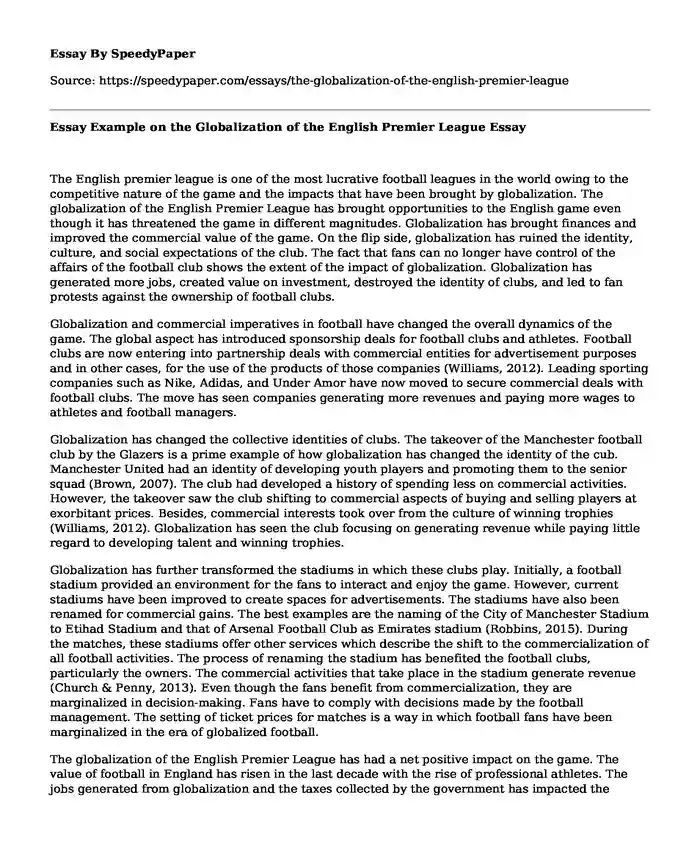The English premier league is one of the most lucrative football leagues in the world owing to the competitive nature of the game and the impacts that have been brought by globalization. The globalization of the English Premier League has brought opportunities to the English game even though it has threatened the game in different magnitudes. Globalization has brought finances and improved the commercial value of the game. On the flip side, globalization has ruined the identity, culture, and social expectations of the club. The fact that fans can no longer have control of the affairs of the football club shows the extent of the impact of globalization. Globalization has generated more jobs, created value on investment, destroyed the identity of clubs, and led to fan protests against the ownership of football clubs.
Globalization and commercial imperatives in football have changed the overall dynamics of the game. The global aspect has introduced sponsorship deals for football clubs and athletes. Football clubs are now entering into partnership deals with commercial entities for advertisement purposes and in other cases, for the use of the products of those companies (Williams, 2012). Leading sporting companies such as Nike, Adidas, and Under Amor have now moved to secure commercial deals with football clubs. The move has seen companies generating more revenues and paying more wages to athletes and football managers.
Globalization has changed the collective identities of clubs. The takeover of the Manchester football club by the Glazers is a prime example of how globalization has changed the identity of the cub. Manchester United had an identity of developing youth players and promoting them to the senior squad (Brown, 2007). The club had developed a history of spending less on commercial activities. However, the takeover saw the club shifting to commercial aspects of buying and selling players at exorbitant prices. Besides, commercial interests took over from the culture of winning trophies (Williams, 2012). Globalization has seen the club focusing on generating revenue while paying little regard to developing talent and winning trophies.
Globalization has further transformed the stadiums in which these clubs play. Initially, a football stadium provided an environment for the fans to interact and enjoy the game. However, current stadiums have been improved to create spaces for advertisements. The stadiums have also been renamed for commercial gains. The best examples are the naming of the City of Manchester Stadium to Etihad Stadium and that of Arsenal Football Club as Emirates stadium (Robbins, 2015). During the matches, these stadiums offer other services which describe the shift to the commercialization of all football activities. The process of renaming the stadium has benefited the football clubs, particularly the owners. The commercial activities that take place in the stadium generate revenue (Church & Penny, 2013). Even though the fans benefit from commercialization, they are marginalized in decision-making. Fans have to comply with decisions made by the football management. The setting of ticket prices for matches is a way in which football fans have been marginalized in the era of globalized football.
The globalization of the English Premier League has had a net positive impact on the game. The value of football in England has risen in the last decade with the rise of professional athletes. The jobs generated from globalization and the taxes collected by the government has impacted the economy positively. Even though these changes have affected the identity of clubs, the overall benefits of this globalization have made English football one of the most watched leagues in the world.
References
Brown, A., (2007). 'Not for sale'? The destruction and reformation of football communities in the Glazer takeover of Manchester United. Soccer & Society, 8(4), 614-635.
Church, A., & Penny, S. (2013). Power, space and the new stadium: the example of Arsenal Football Club. Sport in Society, 16(6), 819-834.
Robbins, G., (2015). From Upton Park to Olympic Park: What does West Ham's move tell us about sport and regeneration? Local Economy, 30(8), 975-982.
Williams, J., (2012). Walking alone together the Liverpool way: fan culture and 'clueless Yanks. Soccer & Society. Vol. 13. No. 3 pp. 426-442.pdf
Cite this page
Essay Example on the Globalization of the English Premier League. (2023, Jan 19). Retrieved from https://speedypaper.net/essays/the-globalization-of-the-english-premier-league
Request Removal
If you are the original author of this essay and no longer wish to have it published on the SpeedyPaper website, please click below to request its removal:
- Free Essay: The Effects of Child Abuse on Social and Emotional Development
- Essay Sample on Neurocognitive Disorder (NCDs)
- Free Essay. The Type of Art and Work That Hassan Wants to Create
- Essay Sample on The Leadership Blind Spots at Wells Fargo
- Essay Sample on Technology and the Education Sector
- Essay Example. Patients and Data Privacy
- Secret Government Paper. Essa Sample
Popular categories





